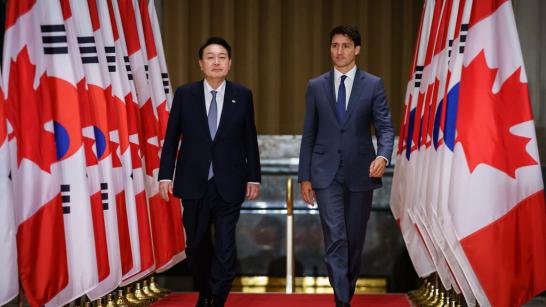
 Introduction
Introduction
Canada and South Korea (formally known as the Republic of Korea or ROK) mark the 60th anniversary of their bilateral relationship in 2023. Throughout these six decades, Ottawa and Seoul have maintained friendly relations, involving regular bilateral political exchanges, similar views about multilateral and global governance, solid trade and investment links, and a degree of military defence cooperation.[1] There has also been a remarkable absence of frictions, save for some market access issues for Canadian agricultural products. But it is fair to say that relations have not reached their full potential. To an extent, the relationship between the two countries thus far has fluctuated between highs, such as the 2014 bilateral FTA, and periods of “friendly neglect.”
Yet, the changing geopolitical and geoeconomic context now make Canada-South Korea relations a “necessary partnership” for both of them. Economic and technological confrontation between China and the US, the Chinese government’s increasing assertiveness and use of coercion, Russia’s aggression of Ukraine, and, more generally, the malfunctioning when not dismantlement of the global governance structures that have benefitted both Canada and South Korea over the decades calls for the two countries to search for reliable and capable partners with which to navigate the changing landscape—while cooperating, together with other middle powers, in trying to preserve as many of these structures from which both benefit. Furthermore, Canada’s and South Korea’s recent launch of their respective Indo-Pacific strategies[2] and South Korea’s ambition to become a Global Pivotal State (GPS), further reinforce the need for a more robust and strategically-oriented bilateral relationship.[3] In fact, Prime Minister Justin Trudeau and President Yoon Suk-yeol already agreed to upgrade the Canada-South Korea relationship to a Comprehensive Strategic Partnership during their summit in September of last year. The partnership focuses on five pillars: defending the rules based international system, democracy, freedom, human rights, and gender equality; strengthening security and defense partnerships, including peacekeeping and maritime security; enhancing economic prosperity and security, cooperating on supply chains, critical minerals, and ST&I, and promoting trade and investment; addressing climate change and the environment, supporting energy security, and developing sustainable energy source; and deepening partnerships in health and culture.[4] The Leaders’ Joint Statement in Commemoration of the 60th Anniversary of Diplomatic Relations between the Republic of Korea and Canada: Stronger Together for the Next 60 Years, issued following the summit between Trudeau and Yoon in Seoul on May 2023, further expanded on these areas of cooperation.[5]
This report seeks to analyze the Canada-South Korea relationship from the perspective of a necessary partnership from which Canada and South Korea can benefit, both in terms of bilateral ties but also in the context of regional and global cooperation.[6] Canada needs to strengthen its relationship with one of the few liberal democracies in Asia and the Indo-Pacific, at a time when it cannot rely on the decades-old liberal international order anymore. South Korea has to boost its ties with Canada as it seeks reliable partners with which it shares values, if it truly wants to become a Global Pivotal State and also diversify its security partners, energy supplies, and diplomatic allies. Working together as well as with other “like-minded” partners, they may even be able to help reinvigorate the liberal international order while truly delivering on their aim to become comprehensive strategic partners.
This report will thus analyze bilateral relations and the potential for cooperation between Ottawa and Seoul in the areas of politics and diplomacy, security, and economics and technology. The report will focus on realistic, actionable cooperation rather than a long wish list, in the hope of supporting sustainable cooperation between Canada and South Korea. A short conclusion will summarize the key points.
[1] Canada-Korea relations can be traced back to the late 19th century, when Canadian missionaries first travelled to the Korean Peninsula. As part of the Commonwealth Brigade, Canada later on was one of 16 countries sending troops to fight together with the South Korean military during the Korean War. Canada provided the third largest number of soldiers among the UN countries, with over 26,000 troops.
[2] Government of Canada, Canada’s Indo-Pacific Strategy, 2022, available at https://www.international.gc.ca/transparency-transparence/assets/pdfs/indo-pacific-indo-pacifique/indo-pacific-indo-pacifique-en.pdf (accessed 31 January 2023); Government of the Republic of Korea, Strategy for a Free, Peaceful, and Prosperous Indo-Pacific Region, 2022, available at https://www.mofa.go.kr/eng/brd/m_5676/down.do?brd_id=302&seq=322133&data_tp=A&file_seq=1 (accessed 31 January 2023).
[3] Yoon Suk-yeol, “South Korea Needs to Step Up,” Foreign Affairs, 8 February 2022, available at https://www.foreignaffairs.com/articles/south-korea/2022-02-08/south-korea-needs-step (accessed 31 January 2023).
[4] Prime Minister of Canada, “The Republic of Korea and Canada: Stronger Together – Joint Leaders’ Statement,” 23 September 2022, available at https://pm.gc.ca/en/news/statements/2022/09/23/republic-korea-and-canada-stronger-together-joint-leaders-statement (accessed 31 January 2023).
[5] Prime Minister of Canada, “Leaders’ Joint Statement in Commemoration of the 60th Anniversary of Diplomatic Relations Between the Republic of Korea and Canada: Stronger Together for the Next 60 Years,” 17 May 2023, available at https://pm.gc.ca/en/news/statements/2023/05/17/leaders-joint-statement-commemoration-60th-anniversary-diplomatic (accessed 22 May 2023).
[6] Research for this report included one interview with a Canadian government official, and two interviews with Korean government officials from two different departments. Interviews were conducted in January 2023. I would like to thank the interviewees, who conducted the interviews under the condition of remaining anonymous. I am also thankful for the comments and suggestions from multiple Canadian officials, especially from the Embassy of Canada to the Republic of Korea.